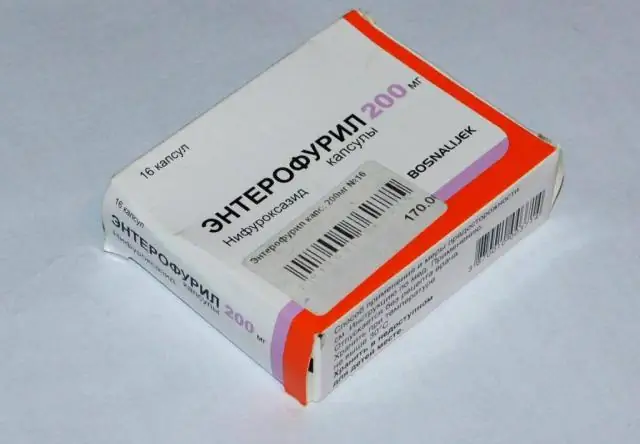- Author Rachel Wainwright wainwright@abchealthonline.com.
- Public 2023-12-15 07:39.
- Last modified 2025-11-02 20:14.
Nifural
Nifural: instructions for use and reviews
- 1. Release form and composition
- 2. Pharmacological properties
- 3. Indications for use
- 4. Contraindications
- 5. Method of application and dosage
- 6. Side effects
- 7. Overdose
- 8. Special instructions
- 9. Application during pregnancy and lactation
- 10. Use in childhood
- 11. For violations of liver function
- 12. Drug interactions
- 13. Analogs
- 14. Terms and conditions of storage
- 15. Terms of dispensing from pharmacies
- 16. Reviews
- 17. Price in pharmacies
Latin name: Nifural
ATX code: A07AX03
Active ingredient: nifuroxazide (nifuroxazide)
Manufacturer: capsules - CJSC FP Obolenskoe (Russia), suspension - LLC NPO FarmVILAR (Russia)
Description and photo update: 28.11.2018
Prices in pharmacies: from 225 rubles.
Buy

Nifural is an antimicrobial agent used for intestinal infections.
Release form and composition
- capsules: hard gelatinous, size No. 2 (dosage 100 mg) and No. 0 (dosage 200 mg), body and cap are yellow; the contents of the capsules are a mixture of granules and yellow powder (7, 8, 10 or 14 capsules in a blister strip, in a cardboard box of 1, 2 or 4 packages);
- suspension for oral administration: yellow with a banana odor (90 ml in a brown glass bottle with a screw cap made of polypropylene with a first opening control, in a cardboard box 1 bottle with a measuring spoon).
Each pack also contains instructions for the use of Nifural.
1 capsule contains:
- active substance: nifuroxazide - 100 or 200 mg;
- additional components: corn starch, microcrystalline cellulose, sugar (sucrose), "extra" category, magnesium stearate;
- cap and capsule body: yellow iron oxide, titanium dioxide, gelatin.
5 ml of suspension contains:
- active substance: nifuroxazide - 200 mg;
- additional components: sodium hydroxide, carbomer, sucrose (sugar), methyl parahydroxybenzoate, citric acid monohydrate, ethanol (ethyl alcohol) 96%, banana flavor, purified water.
Pharmacological properties
Pharmacodynamics
Nifuroxazide is an intestinal antiseptic, a derivative of 5-nitrofuran, which is highly active against microorganisms such as Salmonella spp., Escherichia coli, Campylobacter jejuni, Shigella spp., Vibrio cholerae, Clostridium perfringens, pathogenic Vibrions and Vibriopphyccus spp.
Weak sensitivity to nifuroxazide is characterized by: Proteus indologenes, Enterobacter cloacae, Citrobacter spp.
The following bacteria are resistant to the active substance: Klebsiella spp., Providencia spp., Proteus mirabilis, Pseudomonas spp.
In bacterial cells, the antimicrobial agent is believed to inhibit dehydrogenase activity and protein production. By ensuring the destruction of the membrane of the microbial cell, it reduces the production of toxins by microorganisms.
Nifuroxazide does not lead to the emergence of drug-resistant strains, and cross-resistance with other drugs that have an antibacterial effect is also not noted.
The effectiveness of the active substance is not influenced either by the pH existing in the intestinal lumen, or by the sensitivity of microorganisms to antibacterial agents. Nifural does not change the composition of the normal microflora of the digestive tract, against the background of acute bacterial diarrhea it helps to restore intestinal eubiosis. In case of infection with enterotropic viruses, the drug prevents the development of bacterial superinfection.
Pharmacokinetics
After oral administration, the active substance is practically not absorbed from the digestive tract, demonstrating antibacterial activity only in the intestinal lumen. Nifuroxazide is excreted by the intestines, while unchanged - 20%, chemically altered - 80%.
Indications for use
Nifural is indicated for use for the treatment of acute bacterial diarrhea without deterioration of the general condition, intoxication and fever.
Contraindications
- deficiency of sucrase / isomaltase, glucose-galactose malabsorption, fructose intolerance;
- pregnancy;
- age up to 3 years (for capsules);
- prematurity, neonatal period - the first month of life (for suspension);
- hypersensitivity to any of the constituents of Nifural or nitrofuran derivatives.
The suspension should be taken with caution for the following diseases / conditions:
- liver damage;
- diseases of the brain, traumatic brain injury;
- alcoholism;
- childhood.
During breastfeeding, take Nifural with caution, in a short course and only after consulting a specialist.
Nifural, instructions for use: method and dosage
The drug is taken orally.
Capsules
Nifural capsules must be swallowed whole, without opening or chewing, with a small amount of water. A single dose of the drug is 200 mg - 1 capsule of 200 mg or 2 capsules of 100 mg.
Recommended dosage regimen depending on the patient's age:
- children from 3 to 6 years old: 3 times a day with an interval of 8 hours, 200 mg;
- children and adolescents from 6 to 18 years old: 3-4 times a day with an interval of 6-8 hours, 200 mg;
- adults: 4 times a day with an interval of 6 hours, 200 mg.
Oral suspension
Shake well before taking the drug. A 5 ml measuring spoon is used to dispense the suspension.
The recommended dosage regimen of Nifural suspension, taking into account the patient's age:
- infants from 1 to 6 months: 2-3 times a day with an interval of 8-12 hours, 100 mg (2.5 ml);
- children from 6 months to 3 years: 3 times a day with an interval of 8 hours, 100 mg (2.5 ml);
- children from 3 to 6 years old: 3 times a day with an interval of 8 hours, 200 mg (5 ml);
- children and adolescents from 6 to 18 years old: 3-4 times a day with an interval of 6-8 hours, 200 mg (5 ml);
- adults: 4 times a day with an interval of 6 hours, 200 mg (5 ml).
The duration of therapy for both dosage forms of Nifural is 5-7 days, the maximum course should not exceed 7 days. If during the first 3 days of treatment it was not possible to achieve improvement in the condition, you should consult your doctor.
Taking capsules and suspensions is required only in those doses and according to the method of administration indicated above. If necessary, consult a specialist before taking Nifural.
Side effects
During drug therapy, the occurrence of allergic reactions in the form of skin rash, urticaria, anaphylaxis, Quincke's edema may occur. If you observe an aggravation of these undesirable effects or the appearance of any other disorders, you should stop taking the drug and immediately consult a doctor.
Overdose
Symptoms of an overdose of Nifural are unknown. If there is a suspicion of this condition, symptomatic treatment is prescribed.
special instructions
When using the drug against the background of diarrhea, it is necessary to simultaneously carry out rehydration therapy.
Children under 3 years of age during the period of treatment with Nifural suspension should be under medical supervision.
In case of bacterial diarrhea, accompanied by signs of systemic damage, such as fever, deterioration in general condition, symptoms of intoxication or infection, it is required to consult a specialist and decide on the use of antimicrobial agents of systemic action.
If shortness of breath, itching, skin rash or other symptoms of hypersensitivity develops, treatment with the drug should be discontinued.
During the period of nifuroxazide therapy, it is prohibited to take ethanol-containing drinks.
The suspension contains methyl parahydroxybenzoate, which can provoke the appearance of allergic reactions (possibly delayed).
The capsule Nifural with a dosage of 100 mg contains 0.036 g of sucrose, which is 0.003 6 bread units (XE), with a dosage of 200 mg - 0.071 g, which is 0.007 1 XE.
5 ml of suspension contains 1000 mg of sucrose. 2.5 ml of suspension contains 0.041 65 XE, and 5 ml - 0.083 3 XE. When using the suspension 2 times a day, 2.5 ml, the daily dose of sucrose is 0.083 3 XE, 3 times a day - 0.125 XE. In the case of taking 5 ml of suspension 3 times a day, the daily dose of sucrose is 0.25 XE, 4 times a day - 0.333 XE.
Influence on the ability to drive vehicles and complex mechanisms
Nifural does not adversely affect the ability to drive a car and control any other complex equipment.
Application during pregnancy and lactation
In the course of studies on animals, the teratogenic effect of the drug was not found. However, it is not recommended to take nifuroxazide during pregnancy as a precautionary measure.
During lactation, taking Nifural is possible only on the recommendation of the attending physician, during a short course of therapy. Breastfeeding in this case can be continued.
Pediatric use
The suspension is contraindicated for newborns under 1 month of age and premature infants. Nifural capsules are contraindicated for children under 3 years of age.
In childhood, the suspension should be taken with caution.
For violations of liver function
In the presence of liver disease, the suspension must be used with caution.
Drug interactions
Nifural should not be combined with drugs that cause disulfiram-like reactions, as well as with drugs that have a depressing effect on the function of the central nervous system. In the case of using other drugs (including non-prescription drugs) against the background of therapy, it is recommended to consult a doctor before taking them.
Analogs
Nifural's analogs are: Adisord, Mirofuril, Ersefuril, Nifuroxazid, Stopdiar, Ekofuril, Elufor, Enterofuril.
Terms and conditions of storage
Store in a place protected from light, out of reach of children, at a temperature not exceeding 25 ° C.
The shelf life is 3 years.
Terms of dispensing from pharmacies
Available without a prescription.
Reviews about Nifural
On medical sites, reviews about Nifural (in the form of capsules) are mostly positive. Patients note that the drug quickly and effectively helps to eliminate diarrhea, vomiting and increased gas production, relieves pain and discomfort in the abdomen, and improves overall well-being. Patients also indicate that the antimicrobial agent, neutralizing pathogenic bacteria and protecting against toxins, does not disturb the microflora of the gastrointestinal tract and does not contain toxic substances.
There are no complaints about the appearance of unwanted reactions.
The price of Nifural in pharmacies
The price of Nifural in the form of capsules can be (in a dose of 200 mg) - 250-300 rubles per package containing 16 capsules. The price of the suspension for oral administration is not reliably known, since at the moment it is not on sale.
Nifural: prices in online pharmacies
|
Drug name Price Pharmacy |
|
Nifural 200 mg capsules 16 pcs. 225 RUB Buy |
|
Nifural capsules 200mg 16 pcs. 231 RUB Buy |
|
Nifural 200 mg / 5 ml oral suspension 90 ml 1 pc. 266 r Buy |
|
Nifural suspension for internal approx. 200mg / 5ml fl. 90ml 277 r Buy |

Maria Kulkes Medical journalist About the author
Education: First Moscow State Medical University named after I. M. Sechenov, specialty "General Medicine".
Information about the drug is generalized, provided for informational purposes only and does not replace the official instructions. Self-medication is hazardous to health!






